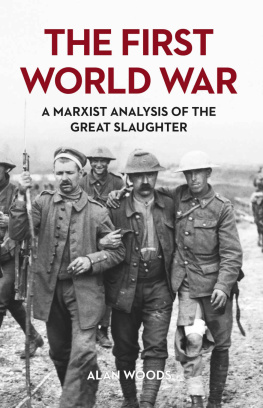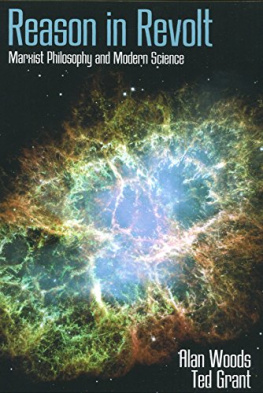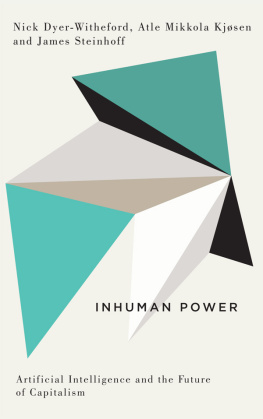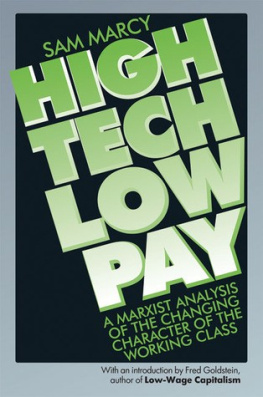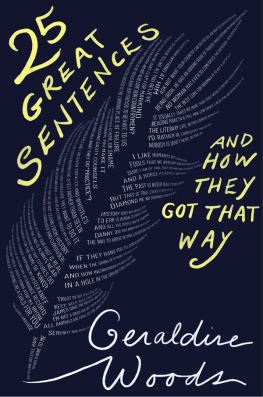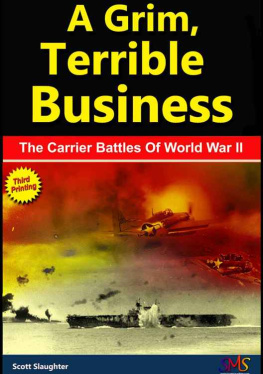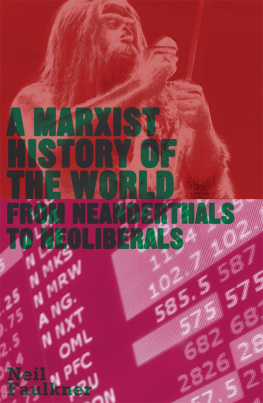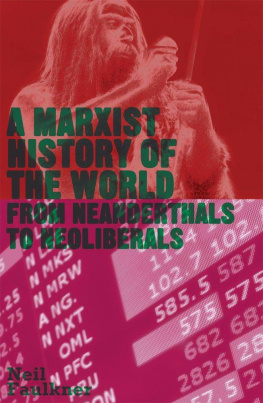Alan Woods - The First World War: A Marxist Analysis of the Great Slaughter
Here you can read online Alan Woods - The First World War: A Marxist Analysis of the Great Slaughter full text of the book (entire story) in english for free. Download pdf and epub, get meaning, cover and reviews about this ebook. year: 2019, publisher: Wellred Books, genre: Science. Description of the work, (preface) as well as reviews are available. Best literature library LitArk.com created for fans of good reading and offers a wide selection of genres:
Romance novel
Science fiction
Adventure
Detective
Science
History
Home and family
Prose
Art
Politics
Computer
Non-fiction
Religion
Business
Children
Humor
Choose a favorite category and find really read worthwhile books. Enjoy immersion in the world of imagination, feel the emotions of the characters or learn something new for yourself, make an fascinating discovery.
- Book:The First World War: A Marxist Analysis of the Great Slaughter
- Author:
- Publisher:Wellred Books
- Genre:
- Year:2019
- Rating:3 / 5
- Favourites:Add to favourites
- Your mark:
- 60
- 1
- 2
- 3
- 4
- 5
The First World War: A Marxist Analysis of the Great Slaughter: summary, description and annotation
We offer to read an annotation, description, summary or preface (depends on what the author of the book "The First World War: A Marxist Analysis of the Great Slaughter" wrote himself). If you haven't found the necessary information about the book — write in the comments, we will try to find it.
Alan Woods: author's other books
Who wrote The First World War: A Marxist Analysis of the Great Slaughter? Find out the surname, the name of the author of the book and a list of all author's works by series.
The First World War: A Marxist Analysis of the Great Slaughter — read online for free the complete book (whole text) full work
Below is the text of the book, divided by pages. System saving the place of the last page read, allows you to conveniently read the book "The First World War: A Marxist Analysis of the Great Slaughter" online for free, without having to search again every time where you left off. Put a bookmark, and you can go to the page where you finished reading at any time.
Font size:
Interval:
Bookmark:

The First World War: A Marxist Analysis of the Great Slaughter
Alan Woods
First Edition, June 2019
Copyright Wellred Books. All rights reserved.
Ebook produced by Martin Swayne. Published June 2019, Smashwords edition.
United Kingdom distribution:
Wellred Books
PO Box 50525
London
E14 6WG
England
Email:
Wellred UK online sales:
WellredBooks.net
United States distribution:
Marxist Books
WR Books
250 44th street #208
Brooklyn
New York
NY 11232
Email:
Marxist Books online sales:
MarxistBooks.com
ISBN: 978-1-913026-13-4
I dedicate this book to my grandfather, George Woods, Private number 13793, the Welsh Battalion, who joint up on 1 September 1914 and served in France until he was demobilised on 24 March 1919.
He taught me everything I needed to know.
The present book originally appeared as a series of articles on the First World War and the Versailles Treaty in the years 2009-2016. With some minor editing, they have now been gathered together in book form, which will hopefully make them available to a larger audience in a more convenient form. I believe that the message of the book retains its full validity and actuality today.
To deal in an introduction with the contents of the book would be both tedious and unnecessary. However, a few words about the method with which I have approached the subject matter is perhaps in order. As a Marxist, I have dealt with the First World War and the Versailles Treaty as I deal with any historical subject, strictly from the standpoint of historical materialism.
It is, of course, tempting to attribute great changes in history to the actions of individuals whether good or evil. History is made by the actions of men and women. To state that is to state the obvious. But it is too superficial to interpret history purely in terms of the subjective intentions of this or that individual. Such a method reduces history to an endless series of anecdotes without rhyme or reason. It is sufficient to note that the ends that individuals had in mind at the commencement of the events they had set in motion very frequently differ to what actually occurs, and are often their diametrical opposite. That is certainly the case with the First World War, and even more so in the one that followed in 1939 to 1945.
If history is merely a string of accidents, it cannot be understood. In the words of Henry Ford, it would be just one damn thing after another. But if the laws governing the universe, from the biggest galaxies to the smallest sub-atomic particles, can be explained and understood, if the evolution of every animal species can be explained by the laws of natural selection, why should the evolution of human society be excluded?
In saying this, it is not my intention to deny the role of individuals, or the complex interplay of political, economic, diplomatic and military-strategic factors that mutually interact to produce a kaleidoscope of events which, at first sight, is difficult to see as anything but incomprehensible chaos. To the untrained observer, the entire universe appears to be just such a chaos. But the scientist strives to penetrate behind this, and to discover the laws that govern nature. The entire history of science is precisely a constant endeavour to do just that.
Actually, anyone who takes the trouble to study history will immediately see that definite patterns emerge, certain processes are constantly repeated, and even certain types of characters emerge time and time again in definite circumstances. Marxists do not deny the role of individuals in shaping history. Indeed, in certain moments, that can be a decisive factor. But it is only one factor in a multifaceted interplay of elements, many of which are completely out of the control of individuals, and constitute powerful constraints to their ability to act at all.
To anyone who wishes to arrive at a serious analysis of the causes of the First World War, and also its results in the Versailles treaty, I recommend a thorough study of Lenins book, written in 1916, at the high point of this monstrous carnival of violence, Imperialism: The highest stage of capitalism. Lenin explains how the division of the world between the imperial powers arose in the second half of the nineteenth century and why German imperialism, arriving on the scene after the French and the British, needed to fight for a redivision of the world. Today, over a century since it first appeared, this remarkable book still represents the most profound, scientific and accurate analysis of the phenomenon of imperialism.
Instead of a trivial description of individual politicians and military figures, the book lays bare the real mainspring of war in the modern epoch, which is the contradiction between the interests of different capitalist states, which in the last analysis, are the interests of the big banks and monopolies. Whoever does not understand this fact will forever be incapable of understanding the nature of modern warfare. And it remains just as valid today as it was then.
I regret to say that one would look in vain for any rational explanation of the First World War in the flood of books, articles and television programmes that accompanied the centenary of that event. Of course, we are aware that the mass media are concerned primarily with entertainment, and to dwell upon the peculiarities of individual personalities is considerably more entertaining than a serious study of facts, figures and processes.
Let us take just one example of how the apparently inexplicable conduct of one prominent player in the great game that led to the outbreak of war in 1914 can be entirely misunderstood if it is viewed merely as the eccentricity of an individual person, divorced from the class interests that in fact determined his conduct. I refer here to Sir Edward Grey, the British Foreign Minister. It has become customary to attribute Sir Edward Greys conduct on the eve of war as a manifestation of supreme incompetence, bumbling, blundering, or simple laziness.
These comments have been made so many times over decades, that they have become accepted as something given, obvious and incontrovertible. Here we have an explanation of the outbreak of war that is highly satisfying to those who wish to portray history as a mere sequence of inexplicable accidents. Great events are the results of either the stupidity or the genius of individuals. In this case, it is argued that Britain stumbled blindly into a war, led by an incompetent politician (or politicians) whose fervent wish for peace blinded him to the serious threat posed by the growing power of German militarism. Such an explanation also has the advantage of soothing the conscience of the British public, who have been reassured for generations that the war was all the fault of the militaristic Germans.
For many years, Sir Edward has been portrayed as a typical example of an effete English aristocracy, whose supine passivity and indifference to events on the Balkans was the result of an overweening sense of superiority that led to a dangerous sense of invulnerability. It is certainly not my intention to gainsay the accusations directed against the British ruling class and its political representatives, but in this particular case, I believe that Sir Edward has been seriously misunderstood. Trotsky was far more perceptive when he stated that, right up to the outbreak of war, British imperialism was playing a complicated and cynical game of bluff, which was intended to fool the German Kaiser and lull him into a false sense of security, and thus lead him into a trap.
Font size:
Interval:
Bookmark:
Similar books «The First World War: A Marxist Analysis of the Great Slaughter»
Look at similar books to The First World War: A Marxist Analysis of the Great Slaughter. We have selected literature similar in name and meaning in the hope of providing readers with more options to find new, interesting, not yet read works.
Discussion, reviews of the book The First World War: A Marxist Analysis of the Great Slaughter and just readers' own opinions. Leave your comments, write what you think about the work, its meaning or the main characters. Specify what exactly you liked and what you didn't like, and why you think so.

